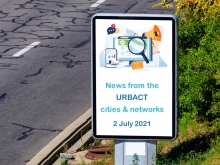Opole
The Agglomeration Opole Trust (AOT) was established in 2013 by 20 municipalities of Opole region. Currently, the AOT has 21 member municipalities. The aim of the cooperation is to overcome obstacles that hamper the socio-economic development of agglomeration, improve the quality of life of its inhabitants and increase the economic competitiveness of member municipalities.
The main areas of cooperation are:
- strategic and spatial planning,
- economic development,
- joint promotional activities to attract foreign investors,
- technology transfer to local business and industry,
- collective transport,
- environmental protection,
- flood protection,
- cooperation in crisis management,
- education,
- culture,
- sport and tourism.
AOT is the Integrated Territorial Investment (ITI) strategy holder and acts as an Intermediate Body (IB) in the implementation structure of Regional Operational Programme for Opolskie Voivodeship 2014-2020 (ROP).
Opole (the largest city of the agglomeration) is the capital of Opolskie region (voivodeship). With its long history dating back to the 8th century is one of the oldest cities in Poland. Once a year, it also becomes the capital of polish song. The National Festival of Polish Song has been held here annually since 1963 and each year new regular events, fairs, shows and competitions take place. Opole is also an academic city with a number of universities and research centres.
The main sectors of the economy are metal industry, agriculture, food processing, cement industry and energy production. Attractive investment areas can be found in both rural and urban areas along A4 highway, connecting the agglomeration with Wroclaw, Katowice and Krakow.
In addition to TROPA VERDE, other projects co-financed by the European Union regarding waste management and recycling (e.g. concerning construction of "green points") are implemented in the metropolitan area.
The city of Opole also participates as a partner in a project called RESOURCEFUL CITIES implemented under URBACT Action Planning Network. This project seeks to develop the next generation of urban resource centres, so they can serve as catalysts of the local circular economy, by adopting a participative and integrated approach.
SOME RELATED NETWORKS
Resourceful Cities
News
News from our cities and networks – 2 July 2021
Article




